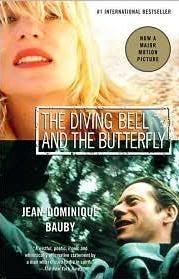|
Wednesday, October 01, 2008
Life in Death
Title: The Diving Bell and the Butterfly: A Memoir of Life in Death
Author: Jean-Dominique Bauby

This morning, with first light barely bathing Room 119, evil spirits descended on my world. For half an hour, the alarm on the machine that regulates my feeding tube has been beeping out into the void. I cannot imagine anything so inane or nerve-racking as this piercing beep beep beep pecking away at my brain. As a bonus, my sweat has unglued the tape that keeps my right eyelid closed, and the stuck-together lashes are tickling my pupil unbearably. And to crown it all, the end of my urinary catheter has become detached and I am drenched. Awaiting rescue, I hum an old song by Henri Salvador: “Don’t you fret, baby, it’ll be all right.” And here comes the nurse. Automatically, she turns on the TV. A commercial, with a personal computer spelling out the question: “Were you born lucky?”
Simply put, read this. But just to be safe, watch the movie first. Books often ruin a movie, but a movie seldom ruins a book, except for when that book is The Last of the Mohicans.
Jean-Dominique Bauby was the editor of French Elle, and the toast of the fashion world, when he suffered a massive stroke that left him almost completely paralyzed. Even his voice was frozen, leaving him nothing more than a nearly inaudible grunt. He was almost completely paralyzed, because he could still blink his left eye. That eyelid became Bauby’s sole means of expression, and with it he dictated this entire book, using a system in which his assistant recited the alphabet and he blinked when she reached the letter he desired. It’s hard to imagine to amount of perseverance and determination this required.
(FYI, Bauby’s right eye was sewn shut to protect the cornea from infection. The film depicts this event from his perspective, creating an intense feeling of claustrophobia as the thin sliver of light is inexorably closed fast. For a few minutes, you think you might know exactly how Bauby felt – completely, utterly helpless.)
But don’t worry that Bauby’s memoir is a downer, or sappily sentimental. The stroke may have cost him his voice and mobility, but his words are as witty and worldly as you’d expect from a man who’d lived as voraciously as he did. In other words, an editor of Elle is not going to write Chicken Soup for the Paraplegic Soul. The memoir chronicles Bauby’s life as a paraplegic (not being able to scratch your nose when a fly lands on it), but also the far-reaching journeys of his imagination as his body lies immobilized in its diving bell. In that sense, this is a compelling celebration of the joie de vivre. You’ll want to read slowly, and savor a glass of wine after finishing it.
And finally, I’m not a superstitious person, but something about this book feels as if Bauby was destined to write it, as if The Diving Bell and the Butterfly perfectly matches an experience with its chronicler, to create a work that will last generations (like Anne Frank and her diary, Boswell’s friendship with Johnson, or Krakauer and the doomed 1996 Everest expedition). Bauby was a master of the material world – possessing looks, wealth, fame, love. He lost it all in a single shattering instant, but lived to write about it in a way no one could forget (and died days after his book was published).
Even Bauby’s name is somewhat uncanny – for an English speaker, at least. The shortened form of Jean-Dominique is Jean-Do: John Doe. He is anonymous, and yet universal. He was alone in his paralysis, and yet, through this work, we can all share in the imaginative life that he found so rich. Labels: fashion, French, memoir, paralysis
posted by Elizabeth at
9:00 PM

0 Comments:
|
|

